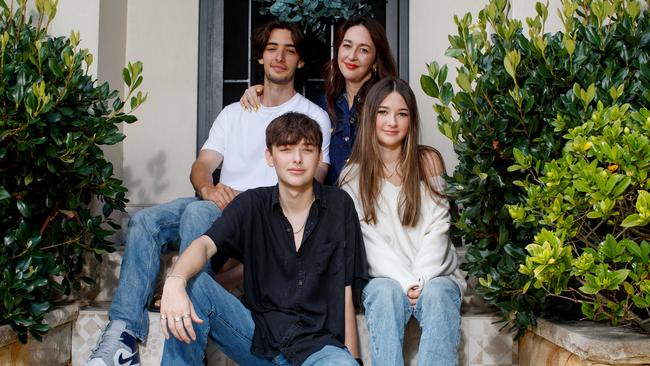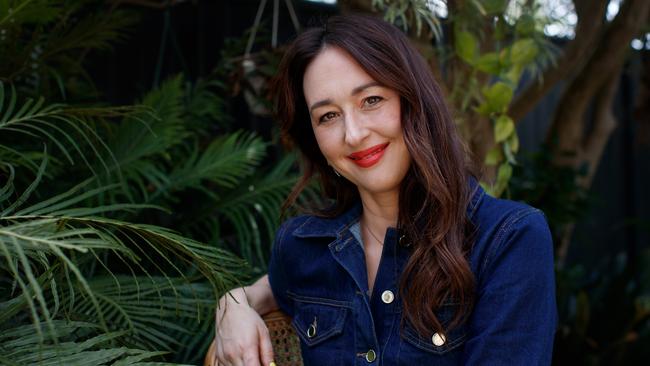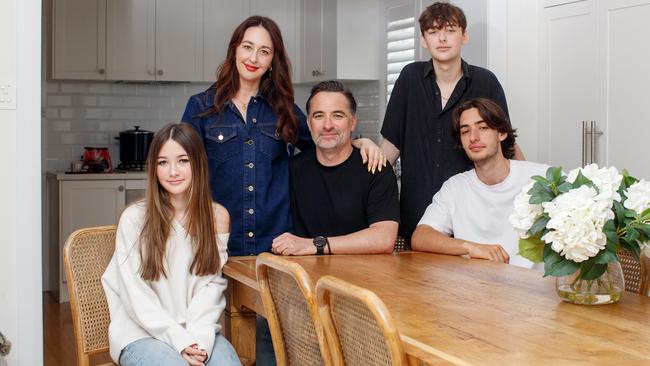A mother’s fight against her genetic curse
Krystal Barter is calm as the mask that will deliver anaesthetic gas into her body is placed gently over her face. The 41-year-old has been here before.

Krystal Barter is calm as the mask that will deliver anaesthetic gas into her body is placed gently over her face. The 41-year-old has been here before. Fifteen years ago, it was her breasts she said goodbye to, this time it is her one remaining ovary.
Ms Barter’s mother and grandmother were among the first women in Australia to be identified following genetic screening as carriers of the high-risk BRCA1 gene variant. Then, a quarter of a century ago, genetic screening was in its infancy, but the identification of the BRCA1 gene mutation was no surprise. As many as 20 women in her family had contracted breast or ovarian cancer in the prime of their lives; a curse that hung like a sword of Damocles over the generations. Ms Barter’s mother was just 36 when she was diagnosed with breast cancer; her grandmother was 44; and her great-grandmother before them was 68.
“It was very traumatic to know that there was something like a cloud hanging over me from a really young age,” Ms Barter says. “I initially didn’t want to be proactive in accessing the testing, but that was until I fell pregnant and had my first beautiful son. I held him in my arms, and I looked at him, and I knew in that moment that I needed to protect him more than I needed to protect myself.

“That was the beginning of my story to try and prevent the cancer that had claimed so many lives in my family. And I really wanted to use my story as a vehicle. There is no greater feeling than knowing that you’ve saved someone’s life.”
Confronting the curse in her genes was the beginning of Ms Barter’s mission as one of the nation’s most active and prominent consumer advocates for genomic medicine.
She watched as the development of genomic medicine gathered pace from a distant dream to now being on the precipice of routine clinical practice. Yet, although the technology stands ready to be deployed and save countless lives, Ms Barter, like many scientists and clinicians in Australia, is now itching to see genomic medicine progress with co-ordinated and equitable access to screening and preventive healthcare across the country.
That’s one reason Ms Barter has co-founded the Genomics Coalition, a people-led movement of patients, experts, and organisations with a co-ordinated advocacy agenda.
“The Genomics Coalition is bigger than BRCA and my story, it’s about the huge opportunity for genomics investment across the system from prevention, diagnosis and treatment for many health conditions,” Ms Barter says.

“But on BRCA, the fact is, I’ve seen so many women in my career diagnosed with an aggressive, say, triple negative breast cancer or a serous ovarian cancer in their 20s, 30s, 40s, and then they find out that they’ve got a genetic mutation,” Ms Barter says. “That is a complete failure of the healthcare system. Often, I’ve spoken to those women and they’ve said, ‘oh, I spoke to my GP’, or ‘I spoke to my doctor’, and they said, ‘you wouldn’t meet the criteria’, or ‘you don’t inherit a risk of ovarian cancer from your dad’.
“Every woman that’s diagnosed that has to use the healthcare system downstream when she should have been offered a test earlier in her life, is an absolute failure of healthcare. There is no other way of explaining it.”
Ms Barter undertook genomic screening when it was in its infancy in 2005. She learned that she too had inherited the BRCA1 gene variant, and the odds of her developing breast cancer was assessed at 87 per cent. Generally, the variant carries an approximate risk of cancer of about 70 per cent.
After mounting a campaign to be eligible for high-risk screening despite being well under the age the health system deemed she was eligible, Ms Barter undertook yearly mammograms. Her push for early access paved the way for other patients.
In 2009, linear lines of calcification were detected in her breast tissue.
“The surgeon said to me, ‘you’ve got two choices; we’ll take you for a biopsy, or you can have your preventive surgery now’. I just said ‘just take my breasts. I don’t want them’. So within two weeks, I was having a preventive double mastectomy at the age of 25.”
She became the first woman in her family to prevent breast cancer.
Eight years later, at 33, Ms Barter had a hysterectomy and one ovary and her fallopian tubes removed to reduce her risk of ovarian cancer. At the time, she was not ready to enter surgical menopause. “Then for my 40th birthday, my gynaecologist called me and said ‘happy birthday. We need to remove that last ovary’.” She had the surgery this year and has sailed through surgical menopause with the assistance of hormone replacement therapy that has minimised the effects.
“I’ve had close to 20 years of my life navigating prevention to try and beat my family’s cancer,” Ms Barter says. “It has been arduous and challenging at times, but I wouldn’t change it at all. I sit here and I feel a sense of relief. I feel like, finally, I faced the fire and I hopefully get to elongate my life – something that wasn’t provided to the women in my family before me. It doesn’t guarantee that I’m not going to get sick from something else, but I literally had a piece of paper that told me what my risk was, and I could have buried my head in the sand, but it really wouldn’t have been doing justice to the women in my family that have suffered, and the science that gave me that gift.”
Ms Barter’s three children – Riley, 19, Jye, 16, and Bonnie, 14 – now have the opportunity, when they choose, to learn of their own status, potentially also avoiding disease. Bonnie is in no doubt that when she reaches the age of eligibility, she will get the test. “It means that if I do have it, I can stop it before it gets bad,” she says.
BRCA1 and BRCA2 are tumour suppressor genes, and high-risk variants can be inherited from either parent. They are associated with breast cancer, ovarian cancer and, to a lesser extent, other cancers such as prostate cancer, pancreatic cancer, and melanoma. The gene variation was made famous by Hollywood actor Angelina Jolie, who chose to have a double mastectomy after genetic screening identified her as a carrier. The BRCA1 or BRCA2 gene variants are thought to affect, conservatively, at least one in 400 people in Australia. They affect women and men equally. Between 5 and 10 per cent of all breast cancers are related to an inherited genetic abnormality.
Despite the gene being first described by American geneticist Mary-Claire King 35 years ago, up to 90 per cent of people with BRCA1 and 2 variants in Australia are estimated to be unaware of the fault in their DNA and do not access genetic screening.
The cost of genomic screening is now low, as little as a few hundred dollars. In Australia, genetic testing guidelines recommend offering genetic testing to breast cancer patients with a greater than 10 per cent probability of harbouring a high-risk variant based on prediction tools. They recommend that a woman with invasive epithelial ovarian cancer should be offered genetic testing for a heritable mutation in BRCA1 or BRCA2, if she has high-grade non-mucinous ovarian cancer diagnosed at 70 years or younger, ovarian cancer at any age with a family history of breast or ovarian cancer, or is from a population where a common founder mutation exists, such as the Ashkenazi Jewish population.
Advocates for wider genetic testing say the thresholds are too restrictive, and that to only offer testing to those already diagnosed with cancer is a cruel policy. Among those advocates is Dr King herself.
“In our experience, about half of women who have devastating mutations in these genes had no family history that would have triggered concern, because the mutation was inherited from the woman’s father rather than from her mother,” Dr King says. “The father remained unaffected. The family was small, so he didn’t have a large number of sisters who might have inherited the mutation and developed breast or ovarian cancer. So there was no way to know. “The testing is as revealing in a woman in that situation as it is in a woman in a family as severely affected as Krystal’s. The testing is straightforward, it’s inexpensive, it’s now very sure, and it can be done without massive disruption to a healthcare system, since it can be done in an online way, including the necessary genetic counselling. Of course, medical follow-up is another matter entirely.
“But this is my message to those of you who are in a position of making policy for health in Australia: it’s very rare that we have the opportunity to have a major impact on devastating diseases in a reasonable way, for a reasonable amount of money that will affect a large number of people.
“This will save many lives. It will enormously relieve the anxiety of young women whose mothers have died of breast cancer. No woman with a mutation in BRCA1 or BRCA2should die of breast or ovarian cancer. It need not happen. It is completely preventable and is absolutely unnecessary.”
Specialist breast surgeon Bruce Mann, director of the combined Royal Melbourne Hospital and Women’s Breast Service in Victoria, says the healthcare landscape is now radically transformed, and that genetic testing has arrived at a “defining moment” in which universal genetic testing should be a routine investigation for virtually all patients with newly diagnosed breast cancer – a notion that was unimaginable a quarter-of-a-century ago. He says the 10 per cent risk criterion for guideline-based testing misses many BRCA carriers.
“Our aim as a society should be that everyone who is carrying one of these mutations should be able to find out that they are a carrier before they are diagnosed, because many people with BRCA develop breast cancer in their 30s and 40s, before the age that is recommended for screening,” Professor Mann says. “It just seems not right and not fair.”

However, population-based screening for BRCA mutations independent of a diagnosis of breast cancer is a much more complex matter that must be underpinned by a health system that is ready to respond, especially by being able to provide wide access to genetic counselling.
Professor Mann says testing across the population would be an enormous task that he did not believe the nation had current capacity to carry out. But mutations could be identified in many people before cancer manifested if everyone who developed breast cancer was screened for BRCA, and then cascade screening of unaffected relatives would pick up carriers before cancer developed.
Still, it is clear that preventive screening holds great promise in the future in potentially avoiding disease and saving the lives of those whose risk is currently invisible to themselves and the health system.
Monash University’s DNA Screen study, which has recruited 10,000 participants, includes BRCA testing and Ms Barter would like to see it ramped up to 100,000 individuals as a national pilot for population-based screening for high-risk actionable conditions.
“The whole path that genetics offers us, to diagnose, treat and prevent, we haven’t implemented that in the way that we need to in healthcare,” Ms Barter said.
“We’ve got the will and the want of all sides of politics. We need to prioritise genomic healthcare, from prevention, diagnosis to treatment, and we need to do it now. It’s been waiting on our doorstep, and Australians need to have access to the right test so that they can make educated decisions to prevent, diagnose and treat. There’s no better time than right now.”
The Genomics Coalition aims to reshape the healthcare landscape and make personalised, preventive care accessible to all. Visit genomicscoalition.org






To join the conversation, please log in. Don't have an account? Register
Join the conversation, you are commenting as Logout